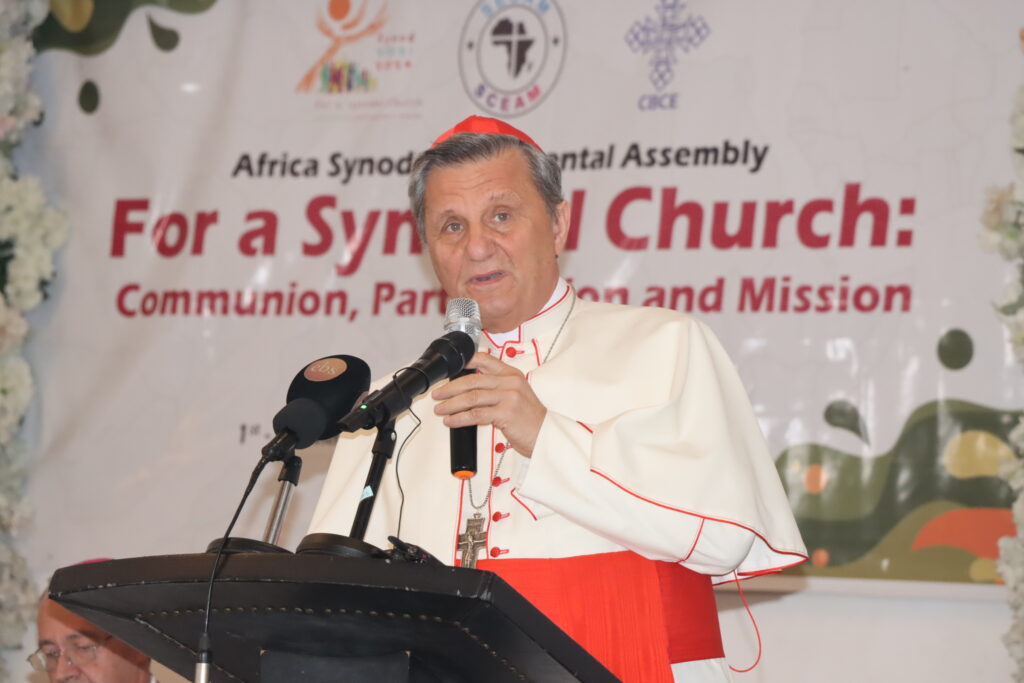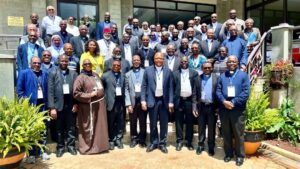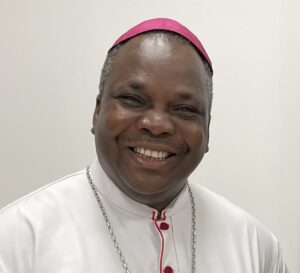SYNOD-SECAM: Success of Synodality Depends on Participation of the People

Secretary General of the Synod, H.E., Mario Cardinal Grech. Credit; AMECEA Online
Mwenya Mukuka
Secretary General of the Synod, H.E., Mario Cardinal Grech says that the success of the process of synodality depends on the active participation of the People of God and the pastors.
He has also said that giving the people of God an active participation in the life of the Church does not detract anything from the hierarchical ministry; on the contrary, it enhances it and manifests its indispensable function in the life of the Church.
Cardinal Grech emphasized that consultation of the people of God in the particular Churches and the discernment of the pastors in the Bishops’ Conferences and their equivalent bodies in the Eastern Churches will help to better situate the event.
He added that consultation in the particular Churches has enabled the people of God to implement that proper way of participating in the prophetic function of Christ, which is manifested in the ‘sensus fidei’ of all the baptised.
“But this ecclesial act did not take place without the bishops. Each pastor initiated the consultation in his own Church and all together, in the respective Bishops’ Conferences, exercised the function of discernment that is proper to the ‘munus docendi.’ We can already consider this dynamism of communion a fruit of the synodal experience, which dispels more than a few initial fears,” Cardinal Grech said.
And on the importance of listening, Cardinal Grech said a synodal Church is a Church of listening and cannot and must not be reduced to a rhetorical phrase.
“If this is true, it must always be true. For many, listening corresponds to a useless waste of time, which favours and even justifies those in the Church who want to create controversy, allowing them to shove spokes in the wheels. It would be strange, however, for us to pretend to mature a true consensus in a Synod on synodality, indeed on the synodal Church, without having fully practised the principle that supports and regulates the exercise of synodality,” he said.
“In the Preparatory Document we asked to listen to everyone, even those furthest away, perhaps taking for granted the listening of those who participate in the life of the Church. Criticism rained down on this indication, as if we wanted to favour some at the expense of others. Everyone means everyone, no one is excluded,” he continued.
He emphasised that the church must become more attentive to the voices within the Church, specifically those voices which agitate and often disturb the ecclesial body.
Cardinal Grech revealed that in the consultation, the Church was able to listen to all voices, except the voice of those who did not speak, either because they could not or did not want to speak.
“We have also listened to the silence. We have also listened to the empty chair. If one could not speak because we have failed to listen, we are invited to ascertain where we have failed. But if one did not want to speak, we must understand their reasons. The truest way, which avoids easy shortcuts, is to create places where everyone can speak; places of encounter where everyone feels they are heard. Truth in the Church does not depend on the tone and volume of statements, but on the consensus, it is able to create precisely from listening to each other,” he said.
The Cardinal said that it is not by speaking against the synod process outside the places of listening that communion can be built because no one is prevented from speaking saying it is the reason why the Spirit must be asked for an additional parrhesia, to fully state people’s convictions, but also to fully listen to the voice of others.
Meanwhile Cardinal Grech says the list of topics found in the Working Document does not constitute the agenda of the Synod.
Speaking when he delivered his remarks at the ongoing continental assembly under the Symposium of Episcopal Conferences of Africa and Madagascar (SECAM) in Addis Ababa, Cardinal Grech said at the conclusion of first phase Synodality is a matter of taking another step forward of fulfilling the task entrusted to this intermediate stage of the synodal process to the best of our ability.
He also expressed desire to preserve the legacy of a tradition that always keeps synodality, collegiality and primacy in relation as necessary and inalienable elements of the synodal process, built on the respective functions of the People of God, the College of Bishops, and the Bishop of Rome.


